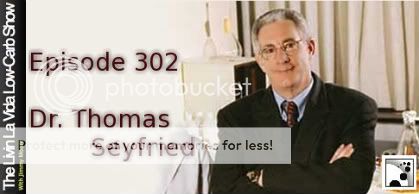
I've had stuff on this on the blog before - e.g. here.
Via facebook - thanks Richard - I learned that Jimmy Moore has posted an interview with
Dr. Thomas Seyfried, a researcher from Boston College who runs the Seyfried Laboratory dedicated specifically to taking a closer look at such diseases as epilepsy and brain cancer.you can listen to the interview here - Definitely worth it.
I'd given up reading Jimmy's blog for a few reasons (his whole folksy style irritates me and his diet winds me up - lots of artificial sweeteners / low carb products and little real food) BUT he works hard on the blog and gives some great information for free.

2 comments:
I listened to the podcast. Interesting stuff. But you could tell Jimmy was a little thrown by the emphasis Dr. Seyfried put on the importance of calorie restriction in a ketogenic diet to keep it healthy!
And yeah, the idea of zero net-carb bagels just seems wrong :).
It was a very interesting interview. Dr Seyfried answered some of the comments and Richard Feinman commented on the calorie restriction point etc:
"Here are some answers from Dr. Seyfried to questions people had about this interview:
What exactly is so dangerous about unrestricted ketogenic eating?
The ketogenic diet contains large amounts of high caloric saturated fats. It is not healthy to eat large amounts of saturated fats. This will contribute to cardiovascular disease and diabetes. High blood glucose levels are associated with high fat consumption even when there are no carbohydrates in the diet. High blood glucose levels will accelerate tumor growth. The liver will synthesize glucose from the glycerol component of the triglycerides. Consequently, the KD should be consumed in restricted amounts, especially over prolonged periods. As I have clearly written in my articles, “more is not better” when it comes to eating the ketogenic diet for either epilepsy or brain cancer.
Does this mean the only safe way to very low-carb is to engage in intermittent fasting or eat tiny meals?
Yes. People can prove this to themselves by simply measuring their blood glucose levels under these conditions.
What about people who do this for management of epilepsy, do they restrict calories, too?
Yes. The KD is always administered in restricted amounts to patients with epilepsy. Seizure protection is lost in epilepsy patients who consume too much KD. Again, it relates to blood glucose levels. Epilepsy is managed best when blood glucose levels remain stable in the low range (65-75 mg/dl).
Are you implying that people who eat an unrestricted ketogenic diet are doing gross metabolic harm?
Gross metabolic harm would happen only if the diet was consumed in large amounts over extended periods, e.g., weeks or months. The diet is healthy only when consumed in small amounts. This will produce the condition of low glucose with elevated ketones."
Richard Feinman:
"One point is that “the ketogenic diet” as traditionally employed is unnecessarily high in fat and mistakenly tries to minimize the sum of carbohydrate and protein. Is this what Seyfried is talking about? Kosoff showed that a low carbohydrate diet is just as effective as traditional KD.
Also, I thought that Browning had shown that the contribution of glycerol to gluconeogenesis did not change on a low carbohydrate diet. What is the reference showing that saturated fat raises blood glucose.
Finally, studies from Volek’s lab show that SFA in the blood does not follow the diet."
http://www.thelivinlowcarbshow.com/shownotes/1172/dr-thomas-seyfried-on-killer-carbs-ketosis-as-a-cancer-cure-episode-302/
Post a Comment